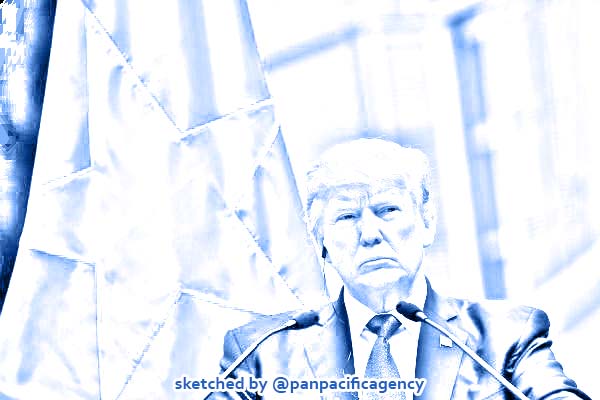Trump’s last stand: 75 days of ‘limitless power’

Donald Trump and Vietnam's flag. Sketched by the Pan Pacific Agency.
WASHINGTON D.C., Nov 8, 2020, News.com.au. Donald Trump’s last 75 days in the White House could spell an unprecedented finale as the angry president exercises “limitless” powers to reward friends and exact revenge against enemies, News.com.au reported.
Rather than being a “lame duck”, the defeated yet still sitting president has been freed from responsibility.
As reported by axios.com, “after defeat, there are no constraints on ordinary presidential powers between the election and the inauguration”.
“He’ll have almost limitless power to reward his friends, settle scores and stack boards and commissions with his allies during his final days in office.”
The Washington Post portrayed the nation as in “unprecedented danger” from an “an angry and unhinged executive” who will be in office until January 20, the day of Joe Biden’s inauguration.
“Mr. Trump could do untold damage with last-day acts, from firing capable senior officials in the intelligence and national security communities to issuing pardons to his criminal associates,” The Washington Post reported.
Apart from granting clemency, which Mr Trump showed a taste for last February, he can rush legislation through, and convert his political appointees’ jobs into permanent positions in the new administration.
Former President Barack Obama filled many federal posts with people who would continue serving after he left office.
As Trump stews over his defeat and launches legal challenges to Joe Biden’s win, Mr Trump may choose to exercise his last stand as commander in chief.
This could be disastrous for global security, if it involves withdrawing troops and diplomats in sensitive regions.
In October, Trump tweeted he would bring 4500 troops in Afghanistan home for Christmas.
Secretary of State Mike Pompeo threatened shutting down the US embassy in Iraq after repeated rocket bombardment by Iranians.
Already a quiet withdrawal of senior military, which had provided a stabilising influence in many African countries, is underway.
Withdrawal from the Middle East could be disastrous, the Washington Post reported, causing a possible return of the Taliban and civil war in Afghanistan.
Not known for his restraint, Mr Trump may seek to distribute favours, as presidents do when exiting the White House and during an unsettled period of transition.
Internationally, he may succumb to approaches from ally Israeli Prime Minister Benjamin Netanyahu to sanction more annexure of Palestinian West Bank settlements.
The Washington Post suggested another Trump friend, Saudi Arabian Crown Prince Mohammed bin Salman could seek favours, which Congress has already opposed.
China could take advantage of the transition period and move heavily on the disputed territory, Taiwan.
The Chinese state publication, the People’s Daily, responded to Trump’s tweet that “I won this election by a lot” with a tweet saying “HaHa” and a laughing emoji.
As far as domestic favours go, Mr Trump has already shown a taste for sparing people a criminal record or freeing them from prison and he is not the first president to do so.
Barack Obama, while in office, but particularly after Trump had won the election as his inauguration date loomed, broke the record for issuing clemency.
In February, Trump went on “a clemency spree” commuting sentences and issuing pardons for 11 people.
The lucky recipients included junk bond king, Michael Milken, and former San Francisco 49ers owner and convicted gambling fraudster, Edward DeBartolo Jr.
After Trump had won the election in November 2016, Obama granted 78 commutations of prison sentences on a single day the following month.
On January 17, 2017, three days before Trump’s inauguration, Obama pardoned 64 people and commuted the sentences of 209, including 109 lifers, including former soldier and WikiLeaks whistleblower, Chelsea Manning.
On his last full day in office, January 19, 2017, Obama commuted the prison sentences of 330 federal inmates, mostly drug offenders with “overly harsh punishments”.
“Presidents who are leaving office usually do not feel wholly unrestrained; in fact, there is now a more immediate and pressing restraint: ‘What will history think of me?’,” retired university expert in presidential transitions, John Burke, told axios.com.
“It might be tempting for him to fire those he deems disloyal, for example, but it will not serve him well over the long run. Pettiness is an expensive exercise.”